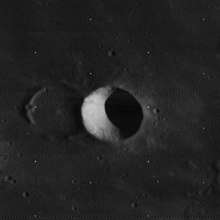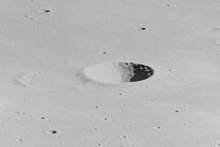Turner (crater)
Turner is a small lunar impact crater that lies in the Mare Insularum, near the Moon's equator. The crater was named after British astronomer Herbert Hall Turner.[1] It is located to the southeast of the crater Gambart. Turner is a circular, cone-shaped crater with inner walls that slope down to the midpoint. A similar-sized ghost crater is attached to the western rim, its interior floor submerged by lava and the surviving rim broken in the southwest.
.jpg)
View of the terminator from Apollo 12, with Turner left of center and Gambart at left. Apollo 14 landing site is in shadow at right (unmarked).
 Lunar Orbiter 4 image | |
| Coordinates | 1.4°S 13.2°W |
|---|---|
| Diameter | 12 km |
| Depth | 2.6 km |
| Colongitude | 13° at sunrise |
| Eponym | Herbert H. Turner |

Oblique view of Turner from Apollo 16
Satellite craters
By convention these features are identified on lunar maps by placing the letter on the side of the crater midpoint that is closest to Turner.
| Turner | Latitude | Longitude | Diameter |
|---|---|---|---|
| A | 1.1° S | 14.7° W | 6 km |
| B | 0.9° S | 10.6° W | 5 km |
| C | 2.4° S | 12.3° W | 5 km |
| F | 1.6° S | 14.1° W | 7 km |
| H | 2.8° S | 13.0° W | 4 km |
| K | 3.8° S | 13.4° W | 4 km |
| L | 3.4° S | 12.5° W | 5 km |
| M | 4.2° S | 11.8° W | 4 km |
| N | 2.9° S | 12.0° W | 4 km |
| Q | 1.0° S | 12.4° W | 3 km |
References
- "Turner (crater)". Gazetteer of Planetary Nomenclature. USGS Astrogeology Research Program.
- Andersson, L. E.; Whitaker, E. A. (1982). NASA Catalogue of Lunar Nomenclature. NASA RP-1097.CS1 maint: ref=harv (link)
- Bussey, B.; Spudis, P. (2004). The Clementine Atlas of the Moon. New York: Cambridge University Press. ISBN 978-0-521-81528-4.CS1 maint: ref=harv (link)
- Cocks, Elijah E.; Cocks, Josiah C. (1995). Who's Who on the Moon: A Biographical Dictionary of Lunar Nomenclature. Tudor Publishers. ISBN 978-0-936389-27-1.CS1 maint: ref=harv (link)
- McDowell, Jonathan (July 15, 2007). "Lunar Nomenclature". Jonathan's Space Report. Retrieved 2007-10-24.CS1 maint: ref=harv (link)
- Menzel, D. H.; Minnaert, M.; Levin, B.; Dollfus, A.; Bell, B. (1971). "Report on Lunar Nomenclature by the Working Group of Commission 17 of the IAU". Space Science Reviews. 12 (2): 136–186. Bibcode:1971SSRv...12..136M. doi:10.1007/BF00171763.CS1 maint: ref=harv (link)
- Moore, Patrick (2001). On the Moon. Sterling Publishing Co. ISBN 978-0-304-35469-6.CS1 maint: ref=harv (link)
- Price, Fred W. (1988). The Moon Observer's Handbook. Cambridge University Press. ISBN 978-0-521-33500-3.CS1 maint: ref=harv (link)
- Rükl, Antonín (1990). Atlas of the Moon. Kalmbach Books. ISBN 978-0-913135-17-4.CS1 maint: ref=harv (link)
- Webb, Rev. T. W. (1962). Celestial Objects for Common Telescopes (6th revised ed.). Dover. ISBN 978-0-486-20917-3.CS1 maint: ref=harv (link)
- Whitaker, Ewen A. (1999). Mapping and Naming the Moon. Cambridge University Press. ISBN 978-0-521-62248-6.CS1 maint: ref=harv (link)
- Wlasuk, Peter T. (2000). Observing the Moon. Springer. ISBN 978-1-85233-193-1.CS1 maint: ref=harv (link)
This article is issued from Wikipedia. The text is licensed under Creative Commons - Attribution - Sharealike. Additional terms may apply for the media files.